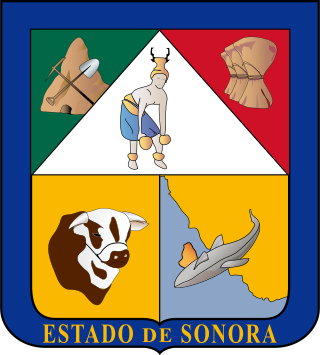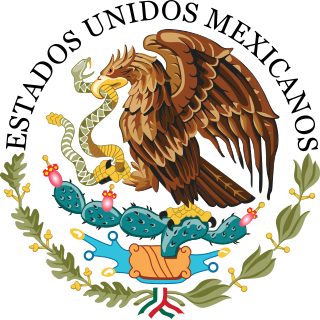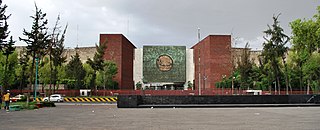Related Research Articles

The United Mexican States is a federal republic composed of 32 federal entities: 31 states and Mexico City, an autonomous entity. According to the Constitution of 1917, the states of the federation are free and sovereign in all matters concerning their internal affairs. Each state has its own congress and constitution.

The Congress of the Union, formally known as the General Congress of the United Mexican States, is the legislature of the federal government of Mexico. It consists of two chambers: the Senate of the Republic and the Chamber of Deputies. Its 628 members meet in Mexico City.

The Chamber of Deputies is the lower house of the Congress of the Union, the bicameral parliament of Mexico. The other chamber is the Senate. The structure and responsibilities of both chambers of Congress are defined in Articles 50 to 70 of the constitution.

The Mexican Empire was a constitutional monarchy, the first independent government of Mexico and the only former viceroyalty of the Spanish Empire to establish a monarchy after independence. It lasted for 2 years from 1821 to 1823. It is one of the few modern-era, independent monarchies that have existed in the Americas, along with the 67-year Empire of Brazil (1822–1889) and the 2-year First Empire of Haiti (1804–1806).

Elections in Mexico are held every 6 years to elect a president and every 3 years to elect a legislature. These elections determine who, on the national level, takes the position of the head of state – the president – as well as the legislature.

Marcela Guerra Castillo is a Mexican politician from Nuevo León. She was a local deputy in the Congress of Nuevo León and twice federal deputy of the Congress of Mexico. From 2012 to 2018, she was a senator representing the state of Nuevo León in the LXII and LXIII Legislatures.

The LIX Legislature of the Congress of Mexico met from September 2003 to August 2006. All members of the lower house were elected in the elections of July 2003 while members of the upper house (Senate) were elected in the elections of July 2000.

The LX Legislature of the Congress of Mexico met from September 1, 2006, to September 1, 2009. All members of both the lower and upper houses of Congress were elected in the elections of July 2006.

The Congress of the State of Jalisco is the legislative branch of the government of the State of Jalisco. It was constituted for the first time after the independence of Mexico on September 8, 1823. Having its first session on September 14 of the same year. The Congress is the governmental deliberative body of Jalisco, which is equal to, and independent of, the executive.

The Honorable Congress of the State of Sonora is the legislative branch of the government of the Mexican state of Sonora. The Congress is the governmental deliberative body of Sonora, which is equal to, and independent of, the executive.
The LXI Legislature of the Congress of Mexico met from September 1, 2009, to August 31, 2012. Members of the upper house of the Congress were selected in the elections of July 2006 while members of the lower house of the Congress were selected in the elections of July 2009.

The LXII Legislature of the Congress of Mexico met from September 1, 2012, to August 31, 2015. All members of both the lower and upper houses of the Congress were elected in the elections of July 2012.

The president of the Chamber of Deputies is the presiding officer of the Chamber of Deputies of Mexico. This position is analogous to the speaker of the House in other legislatures. The incumbent president is Marcela Guerra Castillo. The president is elected for a one-year term.
The federal electoral districts of Mexico are the 300 constituencies or electoral districts into which the country is divided for the purpose of federal elections. Each district returns one federal deputy, who sits in the Chamber of Deputies, the lower house of Congress. An additional 200 deputies are elected by proportional representation from the five electoral regions.

The president of Mexico, officially the president of the United Mexican States, is the head of state and head of government of Mexico. Under the Constitution of Mexico, the president heads the executive branch of the federal government and is the commander in chief of the Mexican Armed Forces. The current president is Andrés Manuel López Obrador. The current president-elect is Claudia Sheinbaum, who will take office on October 1, 2024.

The Federal Government of Mexico is the national government of the United Mexican States, the central government established by its constitution to share sovereignty over the republic with the governments of the 31 individual Mexican states, and to represent such governments before international bodies such as the United Nations. The Mexican federal government has three branches: executive, legislative, and judicial and functions per the Constitution of the United Mexican States, as enacted in 1917, and as amended. The executive power is exercised by the executive branch, which is headed by the president and her Cabinet, which, together, are independent of the legislature. Legislative power is vested upon the Congress of the Union, a bicameral legislature comprising the Senate and the Chamber of Deputies. Judicial power is exercised by the judiciary, consisting of the Supreme Court of Justice of the Nation, the Council of the Federal Judiciary, and the collegiate, unitary, and district courts.

The Congress of the State of Chiapas is the legislative branch of the government of the State of Chiapas. It was constituted for the first time after the state's accession to Mexico on 5 January 1825. The Congress is the governmental deliberative body of Chiapas, which is equal to, and independent of, the executive.

Sonia Mendoza Díaz is a Mexican politician affiliated with the Ecologist Green Party of Mexico (PVEM). She currently serves as a federal deputy in the LXV Legislature of the Mexican Congress from the state of San Luis Potosí. She previously was a senator of the LXII and LXIII Legislatures, a federal deputy during the LXI Legislature and a local deputy in the LVIII Legislature of the Congress of San Luis Potosí, all while with the National Action Party.

The LIII Legislature of the Congress of the Union of Mexico was made up of senators and deputies members of their respective chambers. They began duties on 1 September 1985 and ended on 31 August 1988.
References
- ↑ "Perfil del legislador". Legislative Information System. Retrieved 30 June 2014.